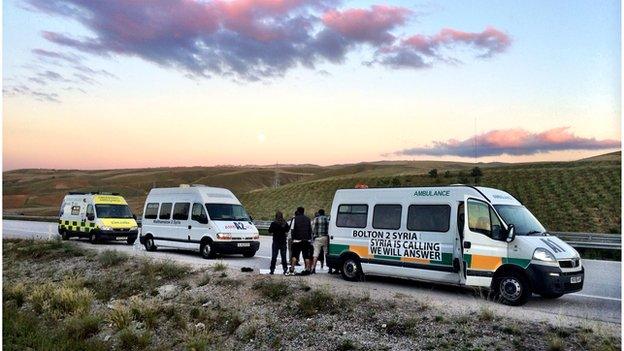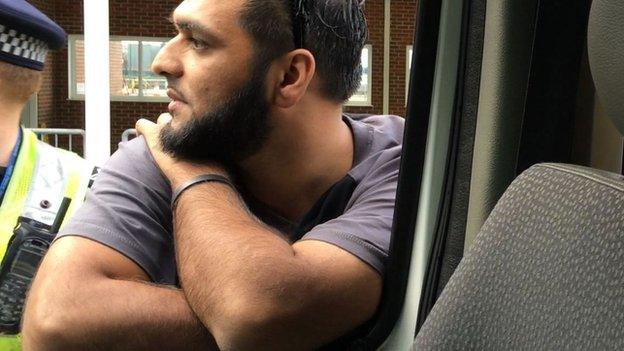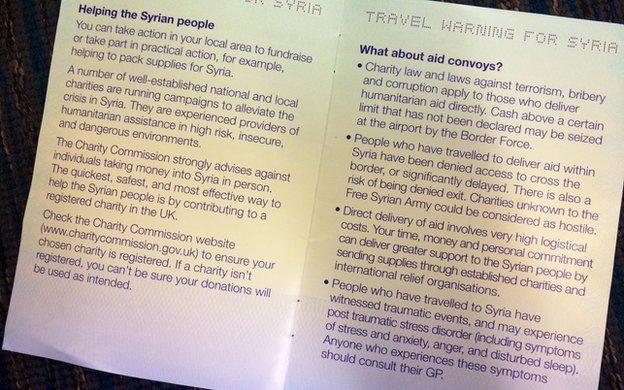Police scrutiny squeezes British aid convoys to Syria
- Published

When small aid convoys started travelling from the UK to Syria after civil war broke out in 2011 they were barely noticed. Now those who travel face having their passports seized and convoys come under suspicion for smuggling money and fighters into Syria. So why are British Muslims still going?
Kasim Jameel puts his head in hands as he receives news from his fellow convoy members: "Are all the lads being questioned? Who's searching? What, there's dogs?"
Nine British Muslims are travelling in three ambulances packed with food and other supplies, and his is the only vehicle that made it through to the ferry without being searched.
The others are stopped by Kent Police and questioned for hours. The group has 3,000 miles (4,830km) to travel to Syria, but at the moment they cannot get past Dover.
Eventually more news comes through from the rest of the group and it is not good.
"They've had a total of £25,000 in cash confiscated, which was meant for the people of Syria," Mr Jameel reports.
This is his 11th trip to Syria. Kas, as he is known, is married with three daughters whom he says he is finding it harder to leave behind to go on these convoys.
He is British Pakistani - his broad Bolton accent gives away his roots - but he says Syria now feels more like home. He has been leading aid convoys to Syria since 2012 and is used to having regular conversations with police and the security services.
The police ask the group about their views on extremist Sunni rebel group Isis (the Islamic State in Iraq and the Levant), on Syrian President Bashar al-Assad and on the killers of Lee Rigby - who was murdered in Woolwich by two converts to Islam. They are quizzed on what they know about the other members of the convoy.

Kasim Jameel plans to fly rather than going overland in future
The police at Dover know Mr Jameel well, and remind him their advice is not to go to Syria. With a resigned smile they hand him a leaflet that details the potential horrors ahead, and points out that aid workers are "very likely to come into contact with terrorists once inside".
The members of the convoy are defiant, insisting their mission is purely humanitarian.
"What upsets me the most is as a Muslim, knowing that there's a chance I may get arrested on the way back , I feel deep down I have to prove that I'm innocent rather than the police trying to prove that I'm guilty," says Naaz Iqbal, a 29-year-old quantity surveyor from Rochdale, who is on his first trip.
"We are going to refugee camps, we're helping people, we're feeding people. If it has any impact on me it makes me a lot more humble. It does not radicalise me, it never will," he adds.
This convoy's modest size is a result of the increased scrutiny facing aid missions and anyone travelling to Syria. Previous expeditions have seen more than 100 people making the journey.
In some cases aid convoys have been used to carry fighters, and the recent jihadi recruitment video in which young British Muslims from Cardiff and Aberdeen call for British Muslims to join Isis has made the threat more real than ever. This is why these convoys are so closely watched by the police.
Prior to leaving, everyone is categorically told not to go by police - and some cancel through fear of getting in trouble with the authorities upon their return.
The Charity Commission has warned that aid on these convoys may be abused for non-charitable purposes.

A police leaflet says people travelling to Syria have seen traumatic events
Those on the convoy say the aim is to deliver ambulances and aid - this time in the form of baby milk, nappies and food - directly to refugee camps and hospitals. They argue that the larger aid agencies are not operating in some of the most dangerous areas, where aid is most needed.
Friends and family contribute funds, and as the convoy travels through Europe various people hand over cash at service stations.
Mr Jameel rejects the allegation the money could be for rebel groups: "If we were funnelling money across would we be as blatant as to liaise with the police beforehand, weeks and weeks beforehand?"
The convoy members tell the police some of the money is for zakat, one of the five pillars of Islam, which dictates that Muslims should donate 2.5% of their wealth to the poor and needy.
Still, the attitude towards Britons going to Syria has shifted dramatically. Everyone here is now viewed as a potential fighter.
Because of the controversy surrounding them, this group is travelling without a charity affiliation - everyone has had to raise money individually to pay for the ambulances and aid.
In a sign that the police and government deterrence may be working, Mr Jameel says this will be his final land convoy.
He plans to carry on going to Syria though, flying into Turkey and buying the aid to deliver from there.
Until then, he will take his chances.
"They want to take my passport from me? They want to jail me? Arrest me for taking baby milk, for taking ambulances, for taking baby food to the Syrians?
"If that happens then so be it," he adds.
Destination Syria will be broadcast on BBC Asian Network at 17:00 BST on Friday, on BBC World News from 20:30 GMT on Friday, and on the BBC News Channel from 04:30 on Saturday.